Warren Buffett is the only top 500 billionaire to profit from President Donald Trump‘s tariffs that have panicked the global stock market.
New figures from the Bloomberg Billionaires Index shows that 499 of the world’s 500 richest men have seen their fortunes decline since Trump took office and sent the global economy into turmoil with his destructive trade war.
First Buddy Elon Musk, who over the weekend made direct yet unsuccessful appeals to the president to reverse tariffs, has experienced a $130billion year-to-date loss in his net worth, according to the data.
Amazon boss Jeff Bezos and Meta CEO Mark Zuckerberg, both of whom attending Trump’s inauguration with front row seats, also recorded losses of $45.2billion and $28.1billion respectively.
But the Berkshire Hathaway CEO’s assets rose by $12.7billion since January 1, following a year spent selling off much of his stocks and hoarding cash.
Buffett, 94, sold off shares of companies like DaVita, Bank of America, CitiGroup, and Apple. He even sold ETFs that he had recently praised as money-makers.
The ‘Oracle of Omaha’, who rarely talks politics, spoke out about Trump’s economic policies, telling CBS News last month that tariffs are ‘an act of war, to some degree’.
Trump has shown few signs of backing down on tariffs despite the mounting pressure as the global market went into freefall, with the S&P 500 dipping almost 20 per cent since its February high, as risk of a US recession and higher inflation grow.
Experts warn Trump’s commitment to tariffs could have devastating effects for the global economy, even though the president is banking that the move will ultimately pay off with new manufacturing jobs.
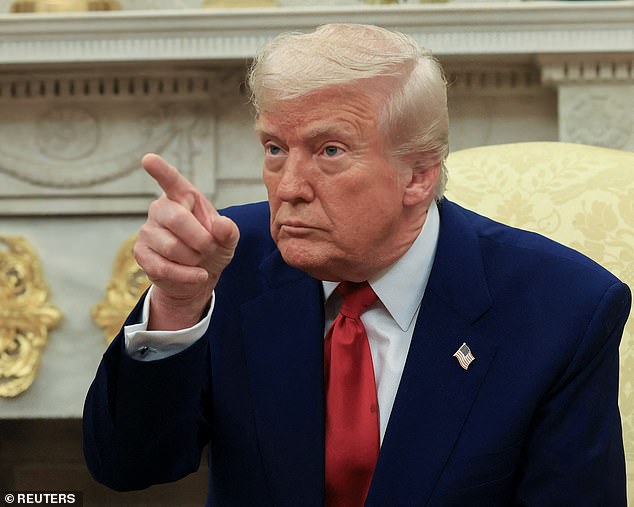
Warren Buffett is the only top 500 billionaire to profit from President Donald Trump’s tariffs that have panicked the global stock market. Trump is pictured in the Oval Office yesterday
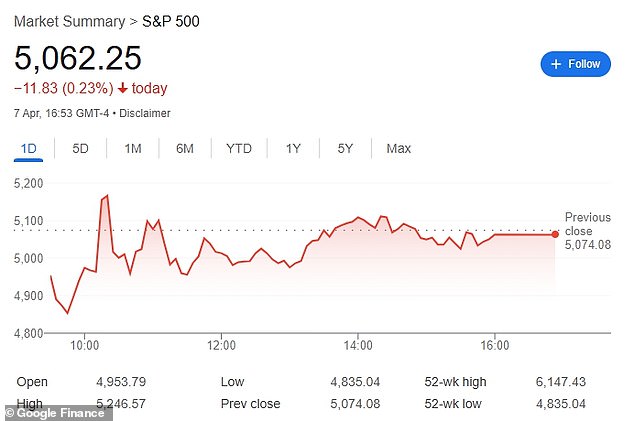
Trump has shown few signs of backing down on tariffs despite the mounting pressure as the global market went into freefall, with the S&P 500 dipping almost 20% since its February high
Buffett, 94, sold off 150 million shares in Bank of America, which had been one of the financier’s most favored stock over the past seven years and the bank’s single largest shareholder, last September.
He also offloaded shares of Apple – the combination of which brought Berkshire Hathaway’s cash reserves to a record $325billion, enough to buy all but the top 25 US companies.
By February, Buffett decided to also get rid of billions of dollars of stock in DaVita, a dialysis provider.
Later that same month, Berkshire Hathaway completely dissolved its shares in two exchange-traded funds, or ETFs, from major investment companies Vanguard and State Street Global Advisors.
Each of Berkshire’s ETF holdings was valued at roughly $22million, according to the Financial Times, and were liquidated in the fourth quarter of 2024.
More recently, it appeared that the so-called Oracle of Omaha was selling his real estate empire.
Compass, the largest real estate brokerage in the country, was in advanced talks last month to acquire Berkshire Hathaway’s HomeServices of America, the fourth-biggest player in the industry, according to The Wall Street Journal.
At the same time, Berkshire focused its investments on Japan, with Buffett telling shareholders in February wrote that he anticipates increasing the firm’s stocks in five Japanese trading houses – Itochu, Marubeni, Mitsubishi, Mitsui and Sumitomo.
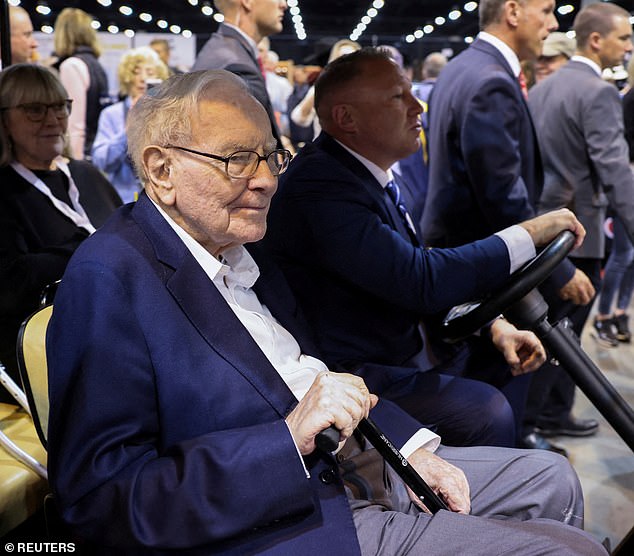
Berkshire Hathaway Chairman Warren Buffett attends the Berkshire Hathaway Inc annual shareholders’ meeting in Omaha, Nebraska on May 3, 2024
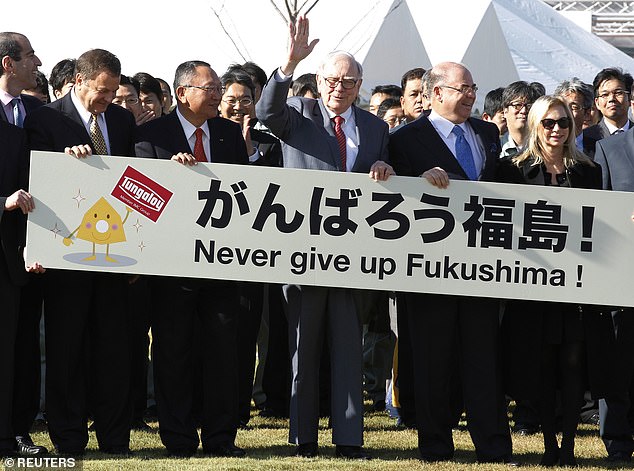
Berkshire Hathaway Chairman Warren Buffett (center) waves as he poses with IMC Group President Eitan Wertheimer (2nd right)and Tungaloy Corp’s Chief Executive Officer Yoshito Uehara (2nd left) at a photo session during the opening ceremony of Tungaloy Corp’s new plant in Iwaki, Fukushima Prefecture on November 21, 2011
Berkshire Hathaway is one of the largest investment companies in the world, with a market cap of $1.06trillion.
The firm wholly owns companies such as Geico and Dairy Queen and parts of Cocoa Cola, Kraft Heinz and Apple.
Buffett began buying up stock in Berkshire Hathaway, which started as a textile manufacturing firm, in the 1960s.
He assumed control of the company in 1965 and phased out its manufacturing interests before buying interests in the Washington Post, insurance firm Geico and oil company Exxon.
Buffett purchased his first shares, in an Oklahoma oil company, at the age of 11.
In 1952, he married his first wife Susan Thompson and the couple had three children – Susan, Howard and Peter – before 1960.
Susan Buffett died in 2004 from a cerebral hemorrhage after suffering from cancer and Buffett went on to marry his second wife Astrid in 2006.
That same year, Buffett announced plans to give more than 80 per cent of his wealth away to charity.
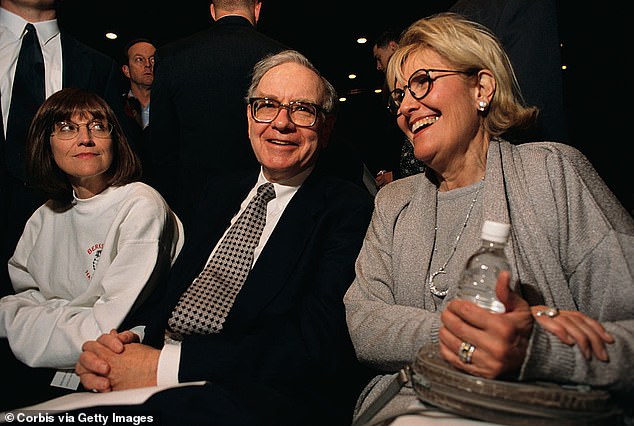
Warren Buffett, CEO of Berkshire Hathaway, attends the company’s annual shareholders’ meeting with his daughter (left) and his wife (right), both named Susan, in 1997
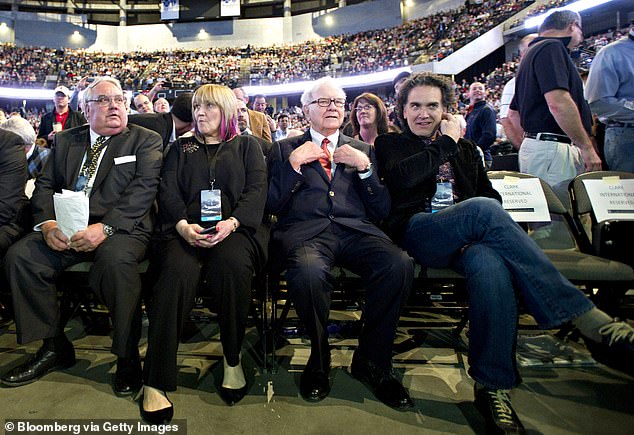
Warren Buffett, chairman of Berkshire Hathaway Inc. (2nd right) sits with his children (from left: Howard, Susie and Peter) on the floor of the Berkshire Hathaway shareholders meeting in Omaha, Nebraska on April 30, 2011
In total, $536billion has been wiped from the world’s 500 wealthiest individuals’ accounts – with Friday alone accounting for a staggering $32.9billion.
That marks the largest single-day loss since the height of the COVID pandemic, according to the New York Post.
Musk – the world’s richest man – saw his net worth plunge $31billion amid the tariffs and ongoing protests at Tesla showrooms in response to his onslaught of the federal government.
In total, the SpaceX founder’s fortune has plummeted by $130billion thus far in 2025.
Bezos, who has also cozied up to the president in recent months, saw $23.5billion worth of his assets wiped out on Thursday and Friday, according to the Guardian.
He was also down another $7.59billion on Monday, for a total loss of $45.2billion this year alone.
Similarly, Zuckerberg had $27billion disappear from his estate as Meta stock fell nearly 14 per cent over the course of two days.
Musk – a Trump adviser who has been working to eliminate wasteful US public spending – urged the president to reverse tariffs over the past weekend, Washington Post reported, citing two people familiar with the matter.
This exchange marked the highest profile disagreement between the president and Musk, the report said.
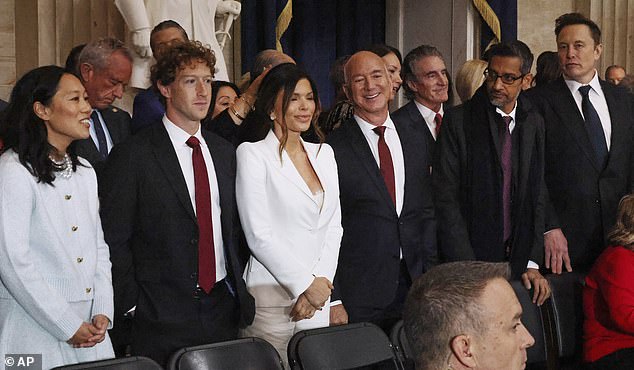
Amazon boss Jeff Bezos and Meta CEO Mark Zuckerberg , both of whom attending Trump’s inauguration with front row seats, have recorded losses of $45.2billion and $28.1billion respectively this year. Pictured from left: Priscilla Chan, Meta CEO Mark Zuckerberg, Lauren Sanchez, Amazon founder Jeff Bezos, Google CEO Sundar Pichai and Elon Musk attending the 60th Presidential Inauguration on January 20, 2025
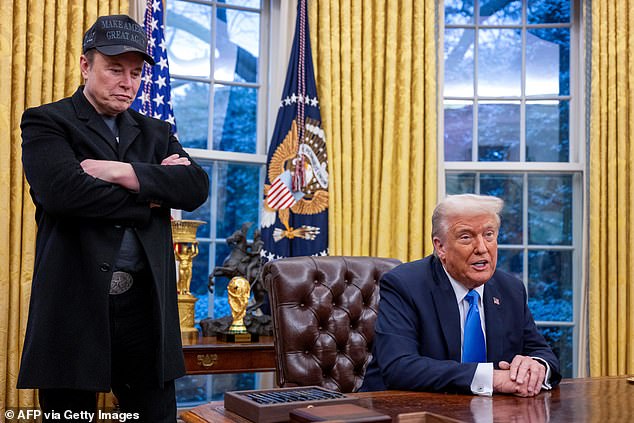
First Buddy Elon Musk – the world’s richest man – said he had hoped for a ‘zero-tariff situation’ between Europe and the US. Musk (pictured with Trump in the Office Office in February) urged Trump to reverse tariffs over the past weekend
The tech tycoon also called for zero tariffs between the US and Europe during a virtual interaction at a congress in Florence of Italy’s right-wing, co-ruling League Party over the weekend.
Tesla has seen its quarterly sales drop sharply amid a backlash against Musk’s work with a new Department of Government Efficiency.
The company’s shares are trading at $233.29 as of its last close on Monday, down over 42 per cent since the beginning of the year. Musk has previously said that the impact of Trump’s auto tariffs on Tesla is ‘significant.’
Trump launched a historic trade war last Wednesday, and China retaliated with 34 per cent reciprocal tariffs on US imports on Friday – stoking fears of a global recession and sparking the worst two trading days for stocks since the pandemic in 2020.
The S&P 500 and FTSE plunged over 10 per cent and 6 per cent respectively after Trump’s announcement. Commodities also tumbled broadly, with oil prices hitting their lowest in four years as of Monday.
Undeterred by a panicked stock market Trump threatened additional tariffs on China on Monday, raising fresh concerns that his drive to rebalance the global economy could intensify a financially destructive trade war.
Trump’s threat came after China said it would retaliate against US tariffs he announced last week.
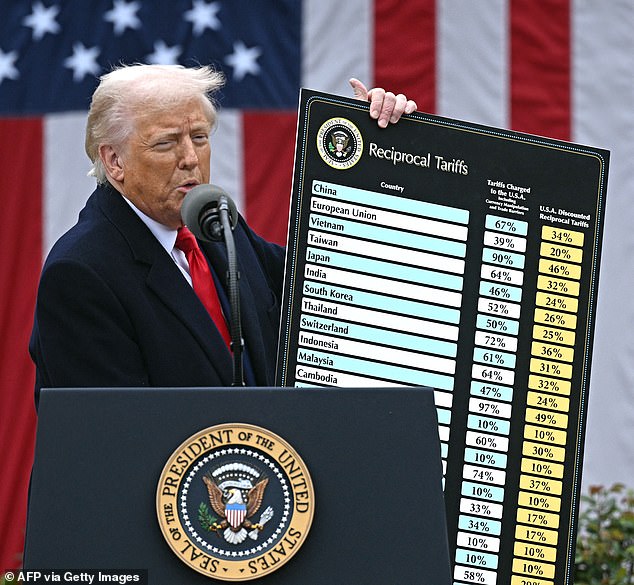
Trump launched a historic trade war last Wednesday (pictured, announcing the tariffs) and China retaliated with 34 per cent reciprocal tariffs on US imports on Friday
‘If China does not withdraw its 34 per cent increase above their already long term trading abuses by tomorrow, April 8th, 2025, the United States will impose ADDITIONAL Tariffs on China of 50 per cent, effective April 9th,’ Trump wrote on Truth Social. ‘Additionally, all talks with China concerning their requested meetings with us will be terminated!’
The US president has shown few signs of backing down on tariffs despite the mounting pressure in the financial markets.
Asked Monday if he would consider a pause on his widespread tariffs, Trump said, ‘We’re not looking at that.’
Trump said he was open to negotiations ‘if we can make a really fair deal and a good deal for the United States.’ He added that it’s possible to have both negotiated settlements with other countries and permanent tariffs.







